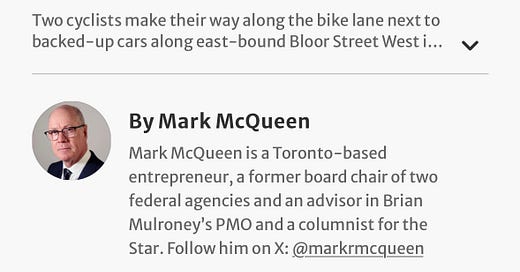From bike lanes to carbon tax to guns — these initiatives don’t stand up to critical analysis
Progressive politicians seem less interested in the data flowing from their initiatives than the political calculus of their expensive, divisive and highly-publicized efforts
If you read my posts last week, you’ll recognize some of the info I marshaled as part of the foundation (see prior post “The Final Word on Toronto's Bike Lane Debate {as if}” Dec 1-24) for this week’s Toronto Star column. The goal wasn’t to counter the message of what you read in Saturday’s Star: Toronto’s traffic is a nightmare. Here’s what some experts say is the biggest culprit and what the city can do about it, by David Rider and Kate Allen. I was well on my way by the time I read that piece, and the essence of my point is not that bike lanes haven’t delivered the goods, but that Progressive politicians seem less interested in the data flowing from their initiatives than the political calculus of their expensive, divisive and highly-publicized efforts.
Anyone who has run a business will appreciate how foreign that is to the daily life of an entrepreneur.
Whether your goal is to expand sales in a foreign country, or increase production throughput, you chose the approach, make your investment (marketing, sales people, equipment), and then monitor how your strategy is working against the goals that you set for yourself.
No business investment comes for free, whether it be advertising/marketing, new hires or a larger factory. As a business owner, the one who must pay the bills, you can’t just “fire and forget.” You check-in each week, if not more frequently, on the impact of your initial decision. Whether things are going well or not, you’re monitoring a host of datapoints, including: execution, staff morale, customer feedback, margins vs. your original plan, incremental sales, and what your competitors did to respond to your new moves.
You iterate.
If things aren’t working, you might invest more in additional ads, change the product or service based on supplier / customer feedback, expand further if there’s clear evidence that achieving some form of critical mass will make the ultimate difference between success and failure, swap out one or more of the new sales people you had hired, or pull the plug entirely. Whatever the government version of this list might be, it feels as though Progressive politicians always chose the same two options:
buy more ads (seek additional media attention)
expand further
Despite what the evidence might suggest. If an entrepreneur doesn’t keep an eye on their monthly results, the business will eventually go bankrupt. Something that keeps one focused on plain, hard facts.
I’ve posted the first half of this week’s Toronto Star column below. If you want to see how it ends, buy a print copy, use your Apple News, or subscribe to The Star online via my special discount code: www.thestar.com/informed:
In this “post-truth” era, Toronto’s hardened bike lanes, the carbon tax, and the Liberal party’s efforts to penalize trained hunters and licensed target shooters are all drawn from the same hymn book. Progressive politicians announced each heartfelt initiative as an evidence-based solution that was beyond reproach — and yet, as time passes, none have withstood the slightest critical analysis.
Advocates of cycling infrastructure promised us improved cyclist safety, personal health benefits, reductions in carbon and noise emissions, as well as reduced traffic congestion. Sounds dreamy.
My friend John Ruffolo was left paralyzed after being hit by a truck while cycling in Markham in 2020, and I wish we could prevent that from happening to anyone else. Ruffolo laments the politicization of bike lanes, while recognizing that it’s not a simple topic: “Traffic in Toronto sucks. Public transit sucks.” He’s all too aware that “cars, trucks and bikes don’t mix, and when they do, someone is going to die — and its usually the cyclist.”
City Hall’s Vision Zero leader, Sheyda Saneinejad, claims Toronto’s strategy is working, and that fatal collisions “have been declining generally since 2016.” That’s not true as far as cyclists are concerned: a single Toronto cyclist lost their life in 2016, a number that’s been the same or higher in each subsequent year.
One cyclist death is one too many, and fatalities are not the only metric on which to assess the value of bike lanes. But Toronto taxpayers built 679 kms of bike lanes over that same seven-year period — 228 kms of which were dedicated lanes — without reducing cycling fatalities. Would that money not have been better spent trying to save some of the 191 homeless Torontonians who died in 2022, for example?
Speaking of prevention, just as city council was extending the Bloor Street West bike lanes to my old stomping grounds near the Humber River in 2021, Toronto Police recorded twelve motorcyclist deaths that year, compared to a single fatal bike accident. Yet we prohibit motorcycles from Toronto’s bike lanes.
You could argue that a Toronto motorcyclist knows the outsized risks they’re taking, but the same could be said about anyone who bikes to work for exercise, rather than safely burning those same calories at home on a Peloton.
To read the rest of the piece, hit the link.
MRM
(this post is an Opinion Piece)





Thank you for saying what needed to be said.